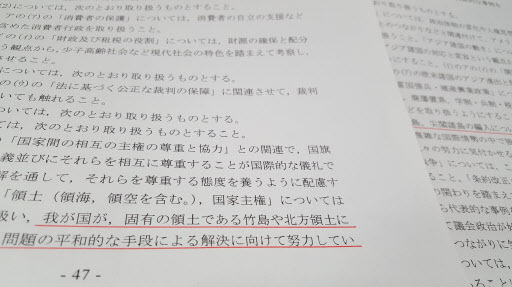Japan stages territorial provocation with teaching manual
By Shin Hyon-heePublished : Feb. 14, 2017 - 18:18
Japan on Tuesday stepped up its claim to Korea’s easternmost islets of Dokdo through a new educational guideline for primary and middle schools, in another move fanning territorial spats amid unabated historical tension over a “comfort woman” statue.
Tokyo’s Education Ministry unveiled a draft of its updated educational guideline in which it stipulates for the first time the islets are “indigenous Japanese territory,” along with the Senkaku/Diayou islands and the Northern Territories -- claimed respectively by China and Russia. It also calls for social life classes to deal with Tokyo’s “efforts to peacefully resolve” the issues.
Tokyo’s Education Ministry unveiled a draft of its updated educational guideline in which it stipulates for the first time the islets are “indigenous Japanese territory,” along with the Senkaku/Diayou islands and the Northern Territories -- claimed respectively by China and Russia. It also calls for social life classes to deal with Tokyo’s “efforts to peacefully resolve” the issues.

Seoul lodged a strong complaint, blasting the claim as a “provocation” and urging its instant retraction. Hideo Suzuki, a minister at the Japanese Embassy, was called in by Chung Byung-won, director general for Northeast Asian affairs at the Foreign Ministry here.
“We cannot refrain from deploring that Japan repeated its unjust claim over Dokdo and demand its immediate withdrawal,” ministry spokesperson Cho June-hyuck said in a statement.
“The Japanese government must realize that the latest amendment will not only instill incorrect perceptions about territory in its future generations, but only cause negative effects in the development of the two countries’ future-oriented relations.”
Tokyo revises the guideline every 10 years in general and last amended it in 2008. It is expected to introduce its final edition in March after a public review period. It would then take effect in 2020 for elementary schools and 2021 for middle schools.
The latest update reflects the Shinzo Abe government’s efforts to match its sovereignty claims in the top educational manual along the lines of its teachers’ handbook, modified in 2014, and existing schoolbooks.
Currently all 19 versions of middle school social studies textbooks and four elementary school textbooks carry the Dokdo claim, according to Seoul officials.
The present handbook also calls for schools to “clearly remind” students in geography courses the islets, there known as Takeshima, are “indigenous Japanese territory but illegally occupied by Korea.” History teachers are required to mention how Japan incorporated Dokdo based on “rational grounds under international law.”
This marks a sharply toughened statement over its previous version in 2008 that merely said “there is a difference” between Korea and Japan on their views on Dokdo.
“The Dokdo claim is not new as it has already been included in the existing guidebook and schoolbooks, but the draft has significance in that it is the highest-level teaching manual,” a Foreign Ministry official here told reporters on customary condition of anonymity.
“We will never accept and sternly respond to any territorial provocation, monitoring the draft and upcoming final guideline’s practical impact on the chalkface and the Japanese government’s intention to make Dokdo a disputed area.”
At the height of the Russo-Japanese War in 1905, Tokyo illicitly annexed Dokdo to install communication and surveillance devices and collect intelligence on Russian naval movements. Japan returned the islets to Korea after winning the war, but then soon pushed to occupy the entire peninsula.
The Abe administration has been ratcheting up its sovereignty assertions via diplomatic and defense papers, teaching and schoolbook guidelines and other methods.
The latest development dealt another blow to bilateral relations, which have been going downhill since Tokyo called its Ambassador to Korea Yasumasa Nagamine to return home last month in protest against the installment in front of the Japanese consulate-general in Busan of a new statue representing Korean women forced into front-line sex slavery during Japanese rule.
The historical tensions led to Tokyo’s territorial provocations, with even its Foreign Minister Fumio Kishida renewing the Dokdo claim after provincial assemblymen here floated a plan to launch another memorial there.
With little signs of a thaw, the mood is likely to remain icy when Seoul’s Foreign Minister Yun Byung-se meets with Kishida on the sidelines of the Group of 20 ministerial conference later this week in Bonn, Germany.
“No matter what, it’s better to sit down and talk than not,” another ministry official said. “Despite the challenges, we will stick to our position that we will respond to the issues in a composed manner.”
By Shin Hyon-hee (heeshin@heraldcorp.com)








![[Graphic News] More Koreans say they plan long-distance trips this year](http://res.heraldm.com/phpwas/restmb_idxmake.php?idx=644&simg=/content/image/2024/04/17/20240417050828_0.gif&u=)
![[KH Explains] Hyundai's full hybrid edge to pay off amid slow transition to pure EVs](http://res.heraldm.com/phpwas/restmb_idxmake.php?idx=644&simg=/content/image/2024/04/18/20240418050645_0.jpg&u=20240419100350)





![[From the Scene] Monks, Buddhists hail return of remains of Buddhas](http://res.heraldm.com/phpwas/restmb_idxmake.php?idx=652&simg=/content/image/2024/04/19/20240419050617_0.jpg&u=20240419175937)

![[KH Explains] Hyundai's full hybrid edge to pay off amid slow transition to pure EVs](http://res.heraldm.com/phpwas/restmb_idxmake.php?idx=652&simg=/content/image/2024/04/18/20240418050645_0.jpg&u=20240419100350)

![[Today’s K-pop] Illit drops debut single remix](http://res.heraldm.com/phpwas/restmb_idxmake.php?idx=642&simg=/content/image/2024/04/19/20240419050612_0.jpg&u=)